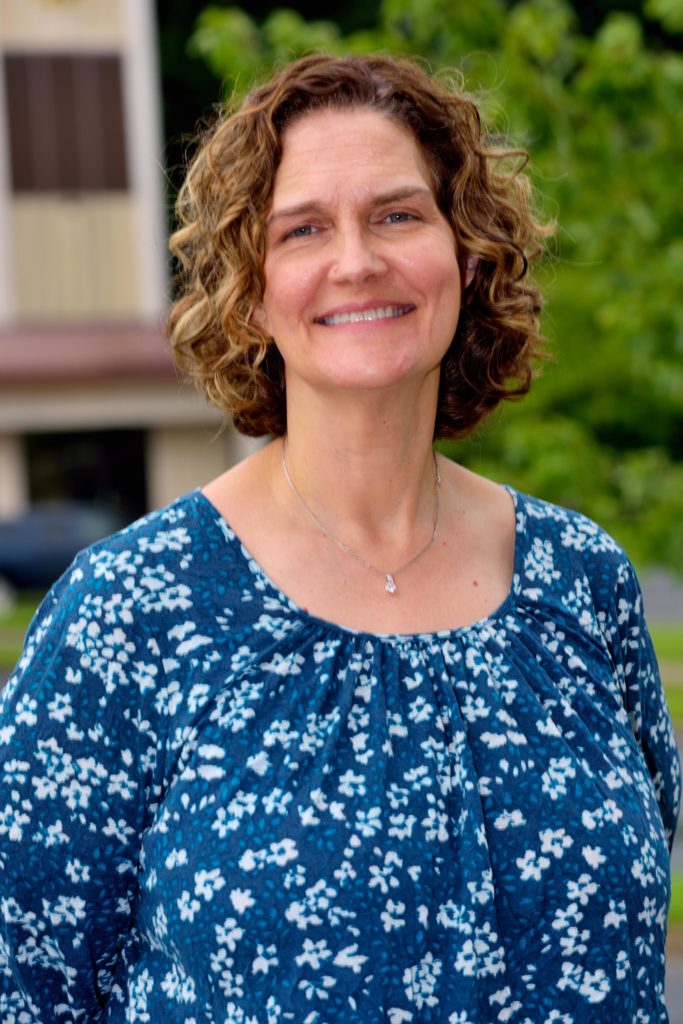Gaston College English Instructor helps students effectively transition to online classes in response to the coronavirus pandemic
Gaston College had to react quickly when North Carolina instituted restrictions and guidelines for responding to the COVID-19 outbreak in early 2020. Keeping students and faculty as safe as possible from the threat of the pandemic required transitioning from classroom teaching to online classes. All faculty and staff alike rose to the occasion, and those with a background and previous experience in distance education helped spearhead the efforts.
One such faculty member was Michele Domenech, a Gaston College English instructor. “Obviously, all classes had to be transitioned to an online format,” she said. “Too many people make this ‘transition’ sound like a button gets pushed and ‘Presto, you’re online.’ That is not how it happens. Weeks of planning and prepping and testing go into creating a good online course.” Domenech has taught online since learning how to write HTML code as part of her undergraduate studies at Texas Women’s University, where she received her BA in English, Mass Communications, and Photography. She earned her MA in English Literature and Composition and Rhetoric from Virginia Commonwealth University. Prior to joining Gaston College in 2015, Domenech taught in Qatar and surrounding countries for VCU and Qatar Foundations. She also taught at the University of Hawaii and at community colleges in Texas and Arizona and at Craven Community College in North Carolina.
Domenech was well aware that methods for teaching online and seated courses are very different. “Where an instructor in a seated course may be able to communicate something to a student verbally that may have been inadvertently omitted from a handout, like a line of instructions, the online instructor must dot every ‘i’ and cross every ‘t’ without fail,” she said.
In addition to her undergraduate work in website and instructional design, Domenech worked as the Director of Technology for the Academic Bridge Program for the Qatar Foundation and was certified as a Blackboard Certified Trainer. Blackboard is a web-based course management system that is designed to allow students and faculty to participate in classes delivered online or to use online materials and activities to complement face-to-face teaching. When the College had to migrate all classes online, Domenech used that background to assist the Distance Ed department. Brian Bookout, a Sociology and History instructor, and Domenech aided Kim Gelsinger, the Director of Distance Education, and Beverly Murphy, eLearning Support Specialist, in giving hands-on assistance to faculty who may not have taught online courses previously but now needed to create tests in Blackboard, scan in documents, make videos, and create actual courses in Blackboard. “Honestly,” said Domenech, “I just did what I was asked to do by Kim Gelsinger because I am a part of a team. We all pull together in times of chaos.”
Domenech is enthusiastic about how Gaston College instructors have learned how to use all the tools Blackboard offers, as well as others that are available. For instance, Domenech uses Zoom for office hours and meetings with students and Playposit, a platform that allows students to interact with videos. Prior to the pandemic, the Arts and Science division had been moving to inclusive access for texts or open source to make it easier and less expensive for all students to have access to texts from the first day of class. Resources like EdPuzzle and Remind are enhancing the student experience, and Domenech considers them welcome additions to instructors’ toolkits.
“I think the best teaching method that has been adopted, though,” she said, “is remembering to think like a student. Not the student you would be today, but the student you were when you first stepped on a campus, unfamiliar with the landscape and the rhythms of college life. Think like your students and about what they need to navigate and successfully complete your online course.”
Gaston College was in the midst of its spring 2020 semester when the novel coronavirus pandemic forced drastic changes in the way classes were being presented. Domenech says that although it was “a whirlwind from day one, the outcome was admirable. The summer semester saw instructors and students reach more of a comfort level and they worked together to be successful in an unknown environment.” She believes that the fall semester, which started on August 20, further showed that instructors have “embraced the challenge and have used it to find better ways of doing what they normally do, only now in an online format.”
Domenech anticipates that the teaching methods necessitated by the pandemic will continue to be applied going forward. “I believe that Gaston College will return to teaching classes stronger and better than before the pandemic,” she said. “Gaston College has some of the most talented faculty I have ever taught alongside. They care for the students first. Because of this student focus, the faculty will continue to utilize the technology to better serve the students and foster more open and collaborative learning communities.”




